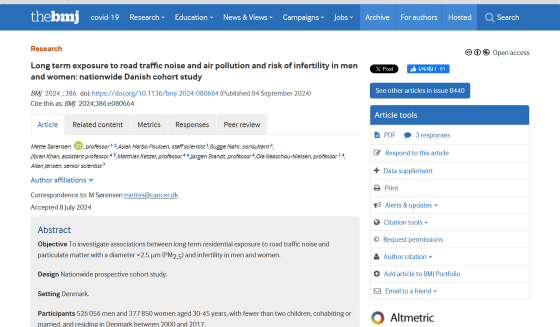Traffic noise and air pollution may have different effects on fertility in men and women

Previous research has shown that
Long term exposure to road traffic noise and air pollution and risk of infertility in men and women: nationwide Danish cohort study | The BMJ
https://www.bmj.com/content/386/bmj-2024-080664

A new study has linked traffic noise and pollution to infertility - but the effects differed for men and women
https://theconversation.com/a-new-study-has-linked-traffic-noise-and-pollution-to-infertility-but-the-effects-differed-for-men-and-women-238223
At the time of writing, it is estimated that one in six people in the world is affected by infertility, and it is important to know the impact of various factors on infertility. In modern society, more than half of the population lives in urban areas, so there is a theory that living in cities with air and noise problems has some impact on infertility.
When humans inhale chemicals from polluted air, they can travel through the blood to the reproductive system. These chemicals can disrupt hormone secretion or directly damage eggs and sperm, reducing fertility . Although the effects of traffic noise on fertility are unclear, some studies suggest that noise may increase the secretion of stress hormones , which may alter fertility.

A Danish research team investigated how exposure to air pollution and traffic noise affects infertility. In Denmark, every citizen is assigned a unique personal identification number and data such as address, work, education, and family structure are stored in a national database.
Using this database, the research team extracted men and women who met the following criteria as likely to be trying to conceive: 30-45 years old, living together or married, having fewer than two children, and living in Denmark between January 1, 2000 and December 31, 2017. After excluding those who were diagnosed with infertility before the age of 30, those who lived alone, and those who were in a registered same-sex partnership, 377,850 women and 526,056 men remained.
They then analysed information from a national patient database in Denmark about whether participants had been diagnosed with infertility, as well as details about where they lived. They estimated the levels of road traffic noise and air pollution, or the concentration of
The analysis revealed that 16,172 out of 526,056 men and 22,672 out of 377,850 women were diagnosed with infertility. Men who were exposed to PM2.5 levels 1.6 times higher than the WHO recommended concentration had a 24% higher risk of infertility. Meanwhile, women over 35 years old who were exposed to noise levels 10.2 decibels higher than the average noise level of 55-60 decibels had a 14% increased risk of infertility.
The risk of infertility from air pollution and traffic noise remained the same even when taking into account factors such as living in an urban or rural area, education level, and income. The results of this study highlight that environmental factors such as air pollution and traffic noise not only have a long-term effect on infertility risk, but that the effects may differ between men and women.

It has also been pointed out that the different effects on men and women may be due to differences in sperm and egg production: Men's bodies produce sperm constantly from puberty onwards, so environmental changes may have an earlier effect on fertility.
On the other hand, women are born with primordial follicles , which are the source of all eggs, and these are stored in a dormant state in the body. During puberty, some of the dormant primordial follicles awaken, gradually develop, and eventually release a single mature egg. Therefore, women have a control mechanism to protect primordial follicles from environmental changes, but long-term exposure to stressors such as noise can have a negative effect.
Although the study has some limitations, such as not examining biological factors like individual hormone levels or weight, and not everyone was screened for infertility, it is an unprecedented large-scale study and a useful step in understanding the effects of air pollution and traffic noise on infertility in men and women.
Related Posts:
in Science, Posted by log1h_ik







